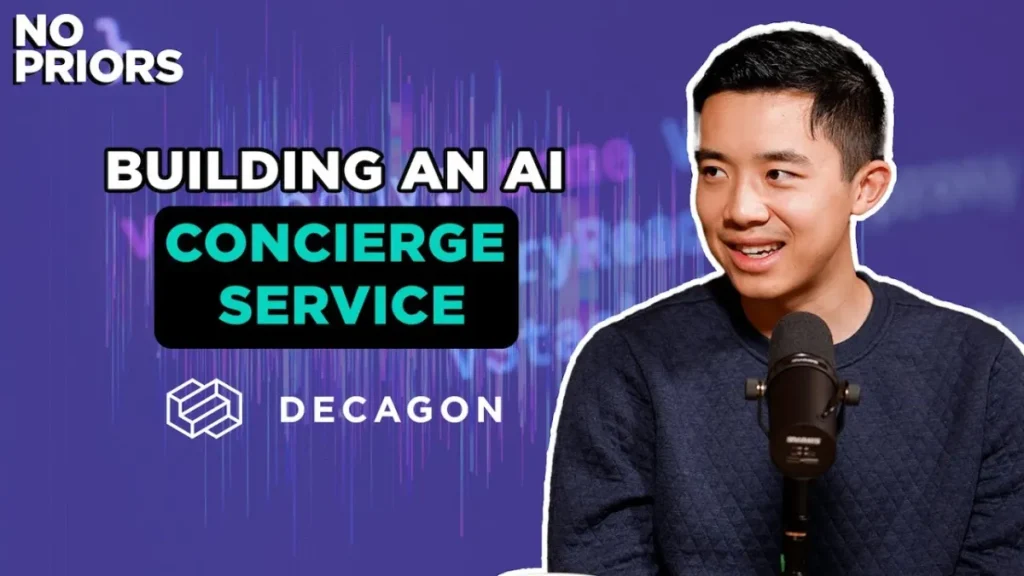“A lot of companies are willing to try things in a way they weren’t willing to before because it’s such a big technology shift, and so all these markets are kind of open now that weren’t before.” This observation from Elad Gil, interviewing Jesse Zhang, co-founder and CEO of Decagon, on the No Priors podcast, encapsulates the transformative moment in artificial intelligence. Zhang’s insights reveal how Decagon is not merely optimizing customer service but fundamentally reshaping its very nature, driving efficiency and redefining the commercial landscape for large enterprises.
Jesse Zhang, a second-time founder with a successful exit under his belt, sat down with Elad Gil to discuss Decagon’s journey, its product, and the broader implications of AI in customer service. Decagon positions itself as an AI customer service agent, a “conversational UI” that aims to provide engaging, personalized interactions for users while simultaneously delivering substantial financial benefits to brands. Their clientele already spans major banks, airlines, telecom providers, and leading tech companies, signaling a significant market penetration in a remarkably short period.
Decagon’s initial traction came from digital-native companies, which are inherently more agile and open to adopting new technologies. However, the unexpected demand from large enterprises quickly pulled Decagon upmarket. Zhang attributes this rapid enterprise adoption to a top-down mandate from C-suites and boards, viewing AI transformation as an imperative, with customer service identified as “the most low-hanging fruit.” This shift in corporate willingness has opened markets previously considered impenetrable for startups.
The impact Decagon’s AI agents are having on these large organizations is profound and quantifiable. Jesse Zhang notes that the primary metric measured by enterprises is efficiency, specifically the reduction of contact center and operational costs. Decagon has achieved “60, 70 percent” cost reduction in successful deployments. Beyond immediate cost savings, the secondary, yet equally critical, metric is enhanced customer satisfaction, fostering greater engagement and potentially driving future revenue.
Decagon’s AI agents serve as a powerful substitute for monotonous human labor, seamlessly integrating into existing CRM and telephony stacks. These agents operate 24/7, require no traditional training, and eliminate churn, offering unparalleled scalability. This direct replacement of routine tasks by AI is not about disrupting existing tooling but augmenting it, allowing human agents to focus on more complex, empathetic interactions.
Zhang’s perspective as a second-time founder offers a crucial lens into Decagon’s strategy. He and his co-founder, Ashwin, both possess strong technical backgrounds. Zhang’s core thesis centers on unlocking the “untapped potential” of highly technical individuals by infusing them with commerciality. While go-to-market challenges can be “hairy,” the commercial problems are immensely rewarding and directly fuel growth. This blend of technical prowess and commercial savvy, refined through previous entrepreneurial experience, is a key differentiator.
Decagon’s hiring philosophy further reflects this strategic blend, prioritizing “very smart people first” over direct experience, especially in the early stages. The company maintains an in-office culture, with many employees even coming in on weekends, fostering an intense, hard-working environment. Zhang believes this approach accelerates progress, particularly when navigating the complexities of early-stage growth in a rapidly evolving field like AI. This commitment to an in-office model, he suggests, is a differentiator in the current tech landscape.
As Decagon matures, the focus shifts from short-term wins to medium-to-long-term strategic planning, encompassing org design and product roadmaps. Zhang emphasizes the importance of studying successful later-stage companies like Ramp and Databricks, particularly their approaches to resource allocation and operational cadence. This foresight is crucial to avoid scaling pitfalls, ensuring sustainable growth rather than encountering breaking points.
Decagon’s unique product approach, which Zhang describes as building a “very productized space,” empowers non-technical business users to build, integrate, iterate, and analyze AI agents. This contrasts sharply with traditional enterprise SaaS, which often demands significant technical resources for customization and maintenance. By offloading logic building to business users, Decagon allows internal teams to rapidly adapt and optimize their AI agents without relying on engineering bottlenecks.
The future, as envisioned by Zhang, is undeniably agentic. Consumer agents are already becoming commonplace, handling everything from DoorDash orders to flight rescheduling. He foresees a world where AI agents interact with each other, performing complex tasks on behalf of humans, fundamentally changing how consumers engage with brands and products. This vision extends beyond reactive support to proactive engagement, with agents capable of making purchasing decisions, upselling, and detecting issues before they escalate. Decagon aims to be at the forefront of this transformation, powering conversations for all major brands and redefining the very essence of customer interaction.

